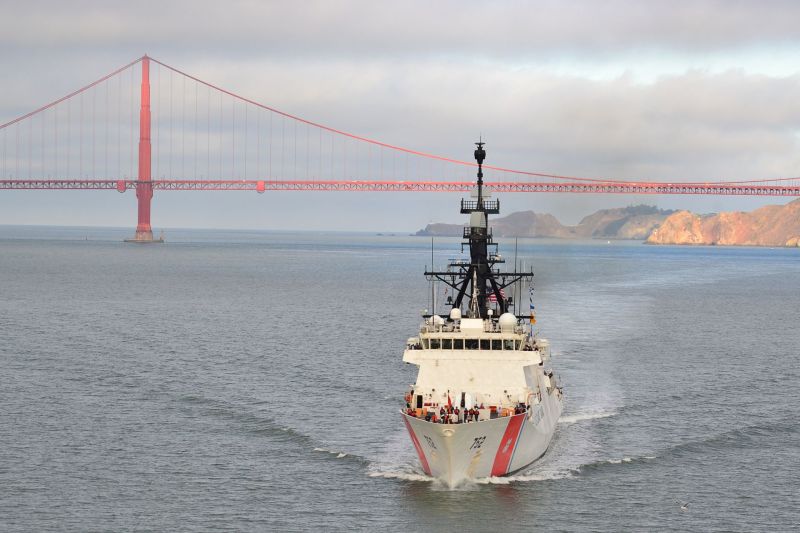All 42,000 Coast Guard members — including approximately 4,000 Coast Guard members in the Bay Area — missed their first paycheck of 2019 yesterday as a result of the ongoing federal government shutdown. Like other unfunded government agencies, the Coast Guard has been operating on a limited basis during the shutdown, though active members have been working without pay to complete missions deemed necessary.
The shutdown is entering its fourth week, making it the longest on record. It has left the majority of federal agencies without a budget, putting thousands of workers deemed “nonessential” on furlough but requiring certain essential employees, such as Coast Guard servicemen and TSA staff, to continue working without pay.
The Department of Defense is funded during government shutdowns, but the Coast Guard — unlike other branches of the military — is housed within the Department of Homeland Security and thus lacks the funding required to pay its employees. The Coast Guard was able to make a one-time emergency payment to its members on Dec. 31, 2018, but the money has since run out.
According to Brandyn Hill, a spokesperson for the local 11th Coast Guard District, the Coast Guard serves a vital role in ensuring safety in the bodies of water that surround the Bay Area. The Guard regularly conducts search and rescue operations for boats in distress; aids in navigation for large commercial ships that come into Bay Area ports; marks safe water for ships using buoys, sound systems and lighthouses and maintains crews on standby to respond to urgent ecological challenges such as maritime oil spills.
During the shutdown, though, the Coast Guard must limit its activities — only pursuing missions crucial to “providing for national security, protecting life and property and protecting the environment,” Hill wrote in an email to The Daily.
“The longer the shutdown lasts, the more difficult it will become for the Coast Guard to maintain mission readiness,” Hill continued.
While members of the Coast Guard can expect to receive back pay for the missed paychecks when the government reopens, the current lack of pay can create dire situations for families who depend on each paycheck to pay bills. Coast Guard leadership even released a guide suggesting that furloughed civilian employees might hold a garage sale or babysit to make up for missed income, naming bankruptcy as a “last option.”
The Coast Guard has since taken down the guide, saying in a statement that it “does not reflect the organization’s current efforts to support its workforce during the lapse.”
According to Hill, the nonprofit organization Coast Guard Mutual Assistance has been offering no-interest loans to junior members to pay for immediate needs, and banks and local communities are stepping up to provide financial support. The head of the Coast Guard, Commandant Admiral Karl Schultz, announced yesterday that Coast Guard Mutual Assistance received a $15 million grant from the United States Automobile Association to be distributed to the Coast Guard’s workforce.
Anja Cangemi, president of the East Bay Coast Guard Spouses Club, said local Coast Guard families have been hit especially hard by the shutdown, given the high cost of living in the Bay Area.
“It’s definitely one of the most expensive places in the country, so for military families, it tends to be a financial hardship, especially when you don’t receive your paycheck,” Cangemi said.
Cangemi, whose husband has served in the Coast Guard for 18 years, moved to Alameda with her family in 2017, where they will stay for the duration of her husband’s two- to four-year tour in the Bay Area. She said that the frequent relocation common among military families, who have to move as often as every two years, can make it even harder to lean on relatives during times of financial hardship.
“We’re originally from the East Coast, so we have no family support here in the area,” Cangemi said. “So trying to find things like childcare tends to be not only costly but a hardship on families.”
The East Bay city of Alameda, where the Coast Guard base is located, has largely rallied around its military families during the government shutdown. Small businesses, such as a coffee shop called The Local, have hosted donation drives to collect necessary items that Coast Guard families might not be able to afford without their paychecks. Cangemi said that a recent drive provided food for 186 families, who were each able to take four to five grocery bags’ worth of canned goods, groceries, diapers and other necessities.
Cangemi expressed gratitude for the support from the local community, which she called “heartwarming.” Still, she emphasized the hardship that the shutdown has imposed on Coast Guard families like her own.
“The situation is definitely a stressful one for our military families,” she said. “We’re not unknown to stresses that we deal with, considering the lifestyles we lead, but this is an unnecessary stress to add to our already stressful situation.”
Contact Katie Keller at ktkeller ‘at’ stanford.edu.
